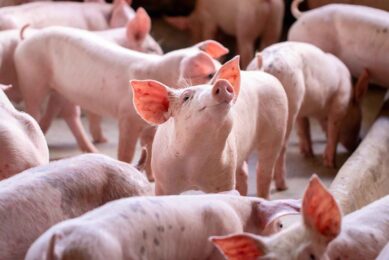Immunisation of pigs with a major envelope protein sub-unit vaccine against PRRSV
Researchers at the Veterinary Faculty from the University of Madrid in Spain studied the immunisation of pigs with a major envelope protein sub-unit vaccine against porcine reproductive and respiratory syndrome virus (PRRSV).
Disease exacerbation was observed in pigs challenged with virulent porcine reproductive and respiratory syndrome virus (PRRSV) following immunisation with a recombinant GP5 sub-unit PRRSV vaccine (rGP5) produced in E. coli.
©
Eighteen animals were divided into three experimental groups: group A were immunised twice IM with rGP5, 21 days apart; group B acted as positive controls (challenged but not immunised); and group C were negative controls. Pigs in groups A and B were challenged 21 days after the second immunisation of the group A animals.
Following challenge, three pigs given rGP5 exhibited more severe clinical signs than the positive controls, including respiratory distress and progressive weight-loss.
©
Although not statistically significant, the more severe disease exhibited by group A animals may suggest previous immunisation as a contributory factor. The mechanisms of these findings remain unclear and no association could be established between the severity of disease, non-neutralising antibody concentrations and tissue viral loads.
©
[The Veterinary Journal]











